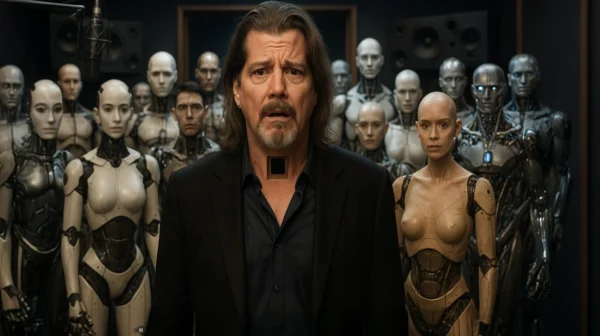Introduction
In an age when the algorithms of Silicon Valley march hand-in-hand with the ambitions of global media conglomerates and political operatives, our most intimate human signature—our voice—is under siege. What follows is not science fiction, but a catalogue of recent outrages that reveal how corporate greed, political expediency, and the relentless advance of technology conspire to strip performers of their livelihood and identity.
Corporate Greed and the Hijacking of Iconic Voices
In May 2025, the battle lines were drawn when Fortnite deployed an AI-replica of Darth Vader’s voice—implicitly borrowing the late James Earl Jones’s baritone—without consent or compensation. SAG-AFTRA rightly cried foul, filing unfair labor practice charges and demanding that studios negotiate over digital likenesses. This was not an isolated misstep, but the opening salvo in a war for digital assets.
Not long after, OpenAI quietly retired its “Sky” voice—accused of echoing Scarlett Johansson’s performance in Her—only after Johansson’s camp protested. Here again, corporate titans gambled that imitation would go unnoticed until public outcry forced a retreat. Such tactics expose how little respect is paid to the unique labor that underlies every nuanced inflection.
Political Operatives and the Weaponization of Trust
When a British satire website used AI to deep-fake Sir David Attenborough narrating a partisan news piece, the reaction was swift and aghast. Attenborough himself spoke of feeling “profoundly disturbed” upon hearing a voice that was never his own delivering unfamiliar political content. This episode underscores how political actors can exploit familiar voices to manipulate public opinion—weaponizing the trust we place in respected figures.
Across the Atlantic, Italy’s RAI network aired a satirical vignette voiced by an AI clone of the late Claudio Capone, famed for dubbing Luke Skywalker in Star Wars—again, without familial consent. Capone’s heir threatened legal action, reminding us that even the deceased are not immune to digital usurpation. Political satire, corporate promotion, or misinformation: the tool remains the same.
Legal Battlegrounds: The Fight for Identity and Consent
In late 2024, voice actors Paul Skye Lehrman and Linnea Sage launched a class-action suit against the AI startup LOVO. They allege the company baited them with promises of internal research use only, then sold their voice clones commercially. The suit charges breach of contract, trademark infringement, and misappropriation—pushing the courts to define whether one’s voice is personal property or a free-for-all dataset.
These legal skirmishes are vital. They force us to ask: when does digital replication become theft? And should corporations be allowed to commodify human expression without consent, negotiation, or fair recompense?
Worker’s Rights and the Desertion of a Generation
Beyond high-profile court cases and union grievances lies a broader threat to all workers. As robotics and AI voice synthesis converge, the promise of a utopian future—where universal basic income liberates us to pursue our passions—begins to ring hollow. Tech evangelists assure us that displaced workers will be gently ushered into new roles while machines handle the drudgery. Yet history tells a different story: mass layoffs, abandoned communities, and skill deserts where entire generations lose their means of support.
The transition to an AI-driven economy is not an act of benevolence but a choice—often made by boards of directors fixated on quarterly earnings rather than human welfare. In this race for productivity, the human cost is an externality too easily dismissed. Without robust safety nets and enforceable rights around digital likeness, we risk creating a cohort of “switchers” left behind by the very systems that promised progress.
Toward a Responsible Technology
These five controversies are more than isolated incidents; they are symptom and warning. They show how corporate avarice, political maneuvering, and unchecked technological prowess can converge to erode our most personal assets. Any utopian vision of AI empowering humanity must be grounded in rigorous protections: performers’ rights to consent and remuneration, legal clarity on digital identity, and an unwavering commitment to those whose voices—and livelihoods—are on the line.









